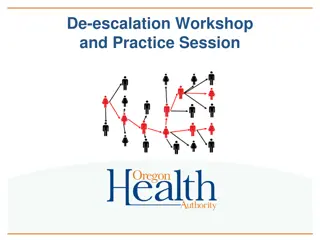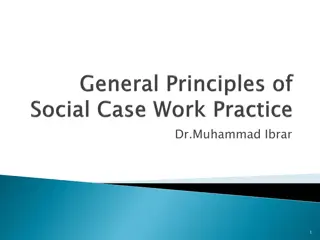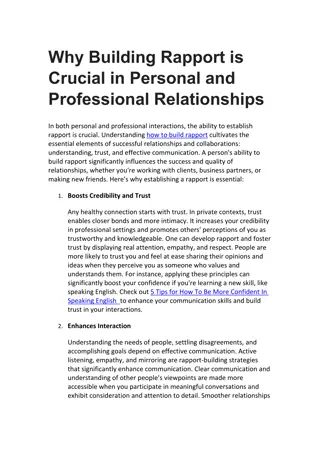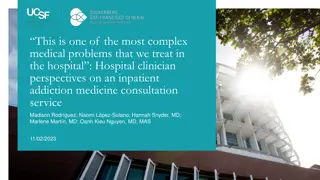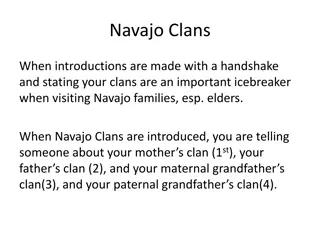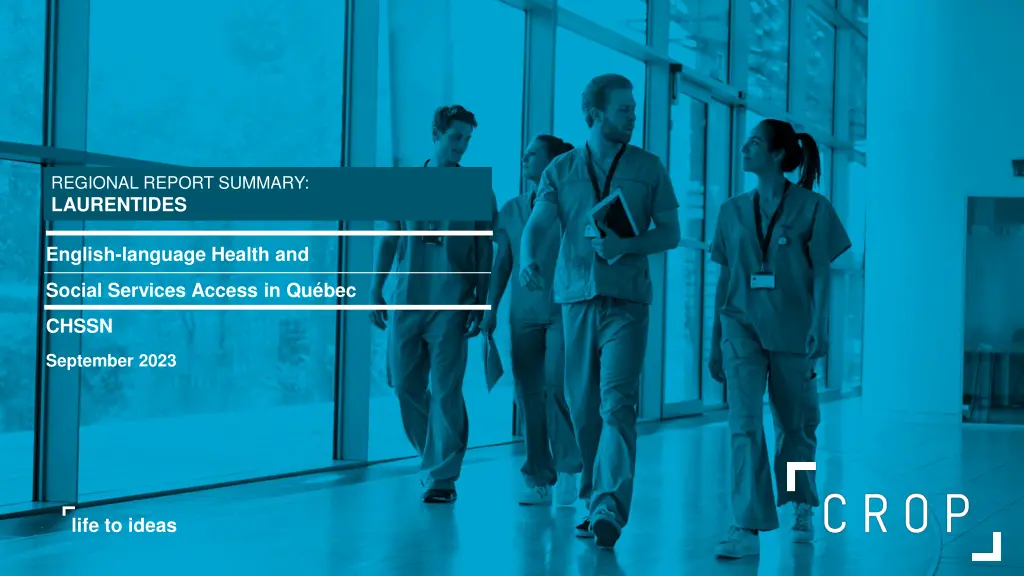
Access to English-Language Health and Social Services in Laurentides
Explore the challenges faced by English-speaking individuals in accessing health and social services in the Laurentides region of Quebec. Discover insights from a comprehensive report highlighting opportunities for improvement in service availability and client satisfaction.
Download Presentation

Please find below an Image/Link to download the presentation.
The content on the website is provided AS IS for your information and personal use only. It may not be sold, licensed, or shared on other websites without obtaining consent from the author. If you encounter any issues during the download, it is possible that the publisher has removed the file from their server.
You are allowed to download the files provided on this website for personal or commercial use, subject to the condition that they are used lawfully. All files are the property of their respective owners.
The content on the website is provided AS IS for your information and personal use only. It may not be sold, licensed, or shared on other websites without obtaining consent from the author.
E N D
Presentation Transcript
REGIONAL REPORT SUMMARY: LAURENTIDES English-language Health and Social Services Access in Qu bec CHSSN September 2023 life to ideas
Context and Methodology 1/2 Introduction to the report The CHSSN (Community Health and Social Services Network) was created in 2000 to support English-speaking communities in the province of Quebec in their efforts to redress health-status inequalities and promote community vitality. In an effort to improve services offered to English-speakers in the different regions of Qu bec, a summary report has been prepared by CROP for each of Qu bec s regions. The results of our analysis are presented in the attached document for English-speakers in the Laurentians. As well as regional results, responses for the entire province (French- and English-speakers separately) are also shown in this report. Data collection CROP conducted this web survey from March 15 to April 17, 2023. In total, 4,318 respondents completed the questionnaire in English and 1,000 in French. Three data collections were done in parallel: TARGET FRENCH-SPEAKERS ENGLISH-SPEAKERS ENGLISH-SPEAKERS Web link distributed via CHSSN partners COLLECTION METHOD Web panel Web panel COLLECTION DATES March 22 30 March 15 -- April 17 March 22 April 17 NUMBER OF RESPONDENTS (n) 1,000 3,500 818 Weighting and data processing Data were weighted based on region, age and gender, using data from the Statistics Canada 2021 Census. All the survey data collected from English-speakers were merged: the data from the survey s web link via CHSSN partners (n=818) with the main survey data via web panel (n=3,500). CROP 2
Context and Methodology 2/2 Data crosses All the data are presented in graphic format, displaying, when available, the results for English- and French-speakers (province of Quebec + regional data) and, when available, the results for French-speakers (province of Quebec only). This study presents the results for English-speakers in the Laurentians. The table below displays the number of respondents per language and region for this study. How to read the data The total for some of the results presented may not always equal 100%, due to rounding. When relevant, the differences in the results between sub-groups are indicated as follows: IN BLUE for higher results IN RED for lower results The same colour codes are used to show significant differences between English-speaking respondents in the study region and English-speaking respondents in the rest of the province. Results for small sample sizes (n<30) are not shown. They are replaced with the code NA (not available). This summary report shows only some specific data. For all the results and details of methodology, please refer to the original report sent to the CHSSN. CROP 3
Executive summary (1/2) The main challenges that need to be addressed with respect to English-speakers and their access to health care and social services in the Laurentians are the following: - Increasing access to public sector family doctors (clinics, GMFs, CLSCs) among English-speaking clients. - 12% of English-speakers in the Laurentians who have access to family doctors use the private sector. - This proportion is equivalent to English-speakers across Qu bec (9%), which is higher than that of French-speakers (4%) in the province. - Improving the level of satisfaction with the availability of health and social services in English. - More than one-third of English-speakers in the Laurentians (35%) give a low score (1-2 / 5) to the availability of services (health and social) in English in the region (note that this is based on a satisfaction scale of 1 to 5 where 1 indicates not at all satisfied and 5 indicates completely satisfied ). This proportion is higher than the results across Qu bec (Qu bec English-speakers: 27%). - Enhancing the availability of health care / social services in English for everyone who needs them. - A significant proportion of English-speakers in the Laurentians were not served in English during their visits to one or more of the evaluated services. The numbers vary but are greater than the provincial average for all services, making the Laurentians one of the regions where the challenge is the greatest. - 55% were not served in English at a CLSC (Qu bec English-speakers: 33%) - 46% were not served in English by Info Sant or Info Social (Qu bec English-speakers: 32%) - 42% were not served in English at a hospital emergency room or out-patient clinic (Qu bec English-speakers: 27%) - 33% were not served in English at the hospital when they stayed overnight (Qu bec English-speakers: 19%) - 29% were not served in English by the doctor they saw at a private office or clinic (Qu bec English-speakers: 18%) - 28% were not served in English by a health professional for a mental health problem (Qu bec English-speakers: 16%) 4 CROP
Executive summary (2/2) - Encouraging staff to be receptive to English-speaking patients. - Compared to the provincial average (Qu bec English-speakers: 23%), a higher number of English-speakers in the Laurentians (31%) do not feel comfortable asking for health and social services in English. - 59% say that they do not feel comfortable due to the attitude of the staff, a result which is similar across the province (Qu bec English-speakers: 56%). - Reducing wait-times. Depending on the service, between 16% and 42% of English-speakers in the Laurentians describe the wait times as bad. - The evaluation of wait times among English-speakers of the region is comparable to what is seen across English-speakers in Qu bec for all evaluated services: - The wait time to see a specialist (for follow-up): 42% assess as bad (Qu bec: 38% of English-speakers and 42% of French-speakers). - The wait time to see a family doctor: 31% assess as bad (Qu bec: 29% of English-speakers and 34% of French-speakers). - The wait time for medical intervention (in a hospital): 25% are unsatisfied (Qu bec: 25% of English-speakers and 33% of French-speakers). - The wait time for an appointment (for a service) at a CLSC: 25% assess as bad (Qu bec: 21% of English-speakers and 22% of French-speakers). - The wait time following a medical intervention: 16% are unsatisfied (Qu bec: 15% of English-speakers and 24% of French-speakers). - Ensuring access to service in English is as important to English-speakers in the region as it is in all of Qu bec. - Depending on the service, between 81% and 90% of English-speakers in the Laurentians believe that it is very important to be served in English when requiring health or social services. The results are comparable to Qu bec (results: between 82% and 91% for Qu bec English-speakers). - 61% believe that it is very important for their understanding to be served in English by emergency room staff, a number similar to the Qu bec average (Qu bec English-speakers: 67%). - 55% believe that it is very important for their understanding to be served in English by health professionals / social services from a CLSC (Qu bec English- speakers: 59%). - Finally, 67% of English-speakers in the Laurentians believe that it is very important to be served in English when there are needs related to mental health, a number similar for all of Qu bec (Qu bec English-speakers: 72%). 5 CROP
Access to services Base: variable Province of Qu bec FRENCH- SPEAKERS Province of Qu bec ENGLISH- SPEAKERS Laurentians ENGLISH- SPEAKERS (%) ACCESS TO A FAMILY DOCTOR All respondents: n= Have a family doctor, including a general practitioner (% yes) 1000 73 4318 74 174 78 SITE OF VISIT TO FAMILY DOCTOR Respondents with a family doctor, n= In a clinic, GMF, CLSC In a private medical office 732 95 4 3181 87 9 136 84 12 ASSESSMENT OF WAIT TIMES Describe the wait time as bad in the following circumstances (% bad + very bad) Respondents with a family doctor, n= Before seeing a family doctor Respondents who were referred to a specialist, n= Before seeing the specialist (for follow-up) Respondents who received medical intervention in a hospital, n= Before the medical intervention took place Respondents who received medical intervention that required follow-up, n= Before the follow-up appointment (following medical intervention) Respondents who used the services of a CLSC in their region, n= Before obtaining an appointment (for service) at the CLSC 732 34 430 42 184 33 148 24 364 22 3181 29 2299 38 1614 25 1343 15 2110 21 136 31 88 42 64 25 45 16 69 25 6 CROP
Service in English Base: variable Province of Qu bec FRENCH- SPEAKERS Province of Qu bec ENGLISH- SPEAKERS Laurentians ENGLISH- SPEAKERS (%) SATISFACTION REGARDING THE AVAILABILITY OF HEALTH SERVICES AND SOCIAL SERVICES IN ENGLISH IN THE REGION (responded 1 or 2 /5, 1: not at all satisfied, to 5, totally satisfied) All respondents (excluding those who do not use the services), n= 4084 166 Are unsatisfied with the level of available services in English -- 27 35 LEVEL OF SERVICE IN ENGLISH Were not served in English in the following circumstances: (% no) Respondents who saw a doctor in a private office or clinic, n= During a consultation with a doctor in a private office or clinic Respondents who used services at the CLSC In their region, n= During their most recent visit to a CLSC Respondents who used Info Sant or Info Social, n= When using the Info Sant or Info Social services Respondents who used a hospital emergency room or hospital outpatient clinic, n= When visiting a hospital emergency room or hospital outpatient clinic Respondents who stayed the night in hospital, n= During a stay (at least one night) in hospital 2352 18 2110 33 1791 32 1907 27 1194 19 99 29 69 55 66 46 71 42 40 33 -- -- -- -- -- Respondents who used mental health services, n= During a mental health consultation with a health and social services professional 1291 45 -- 16 28 7 -- : Question not asked CROP
Importance of being served in English Base: variable Province of Qu bec FRENCH- SPEAKERS Province of Qu bec ENGLISH- SPEAKERS Laurentians ENGLISH- SPEAKERS (%) THE IMPORTANCE OF BEING SERVED IN ENGLISH IN GENERAL Believe that it is very important to be served in English in the following places (% it was very important to receive services in English) Respondents who were served in English during a doctor s visit in a private office or clinic, n= During an appointment with a doctor in a private office or clinic Respondents who were served in English during a CLSC visit in their region, n= During their most recent visit to the CLSC Respondents who were served in English when using Info Sant or Info Social services, n= When using Info Sant or Info Social services Respondents who were served in English during a visit to the emergency room or outpatient clinic, n= When visiting a hospital emergency room or outpatient clinic Respondents who were served in English when they spent the night in hospital, n= During a stay (at least one night) in hospital 1899 84 1405 82 1221 88 1362 87 949 89 69 84 30 82 34 90 40 81 26 NA -- -- -- -- -- Respondents who were served in English when using mental health services, n= During a mental health consultation with a health and social services professional 1073 31 -- 91 89 8 -- : Question not asked CROP
Importance of access to English professionals + being comfortable requesting services in English Base: variable Province of Qu bec FRENCH- SPEAKERS Province of Qu bec ENGLISH- SPEAKERS Laurentians ENGLISH- SPEAKERS (%) IMPORTANCE OF BEING SERVED IN ENGLISH BY PROFESSIONALS FOR UNDERSTANDING Believe it is very important to be served in English by (% very important) Respondents who used CLSC services in their region, n= Health and social services professionals at the CLSC Respondents who used a hospital emergency room or outpatient clinic, n= Health and social services professionals in the hospital emergency room or outpatient clinic 2110 59 1907 69 55 71 -- -- 67 61 IMPORTANCE OF PROVIDING SERVICE IN ENGLISH SHOULD THE NEED ARISE Believe it is very important to be served in English if there is a need for service in (% tr s important) All respondents, n= Mental health support 4318 72 174 67 -- BEING COMFORTABLE REQUESTING SERVICE IN ENGLISH All respondents, n= Do NOT feel comfortable requesting service in English when requiring service in a health or social services establishment Respondents who did not feel comfortable requesting service in English, n= Do not feel comfortable requesting service in English due to the attitude of the staff 4318 174 23 -- 31 1056 58 56 59 -- 9 -- : Question not asked CROP






